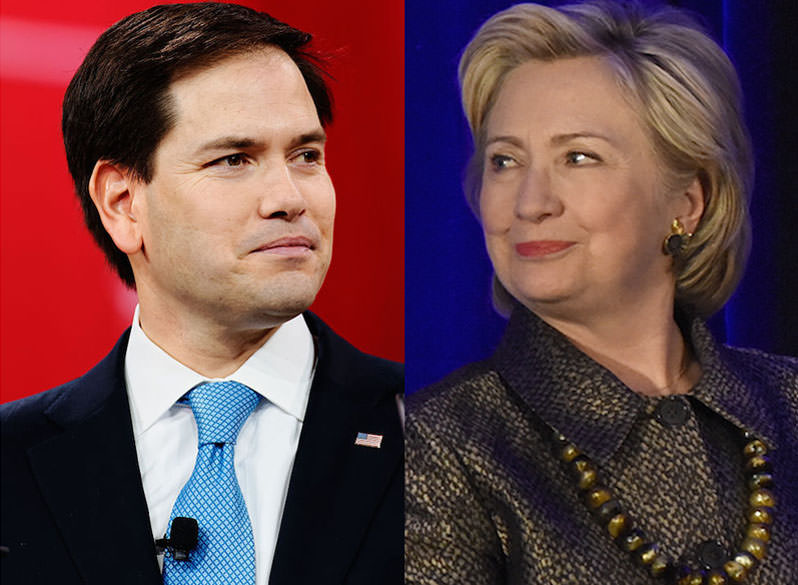The Self-Proclaimed Winners of Iowa
Overall, it was a long evening that offered too many declarations of triumph -- I counted four -- and too little clarity about what either party ultimately wants in a presidential nominee. Overall, it was a long evening that offered too many declarations of triumph—I counted four—and too little clarity about what either party ultimately wants in a presidential nominee. Marco Rubio and Hillary Clinton. (Composite: Michael Vadon, CC by SA / a katz, Shutterstock)
Marco Rubio and Hillary Clinton. (Composite: Michael Vadon, CC by SA / a katz, Shutterstock)
The only thing missing from Marco Rubio’s victory speech Monday night was the victory: In Iowa’s Republican caucus, Rubio finished not first, not second, but third. Was he expecting a bronze medal?
Overall, it was a long evening that offered too many declarations of triumph — I counted four — and too little clarity about what either party ultimately wants in a presidential nominee. The war between insiders and outsiders rages on, and there is no reason to believe it will end anytime soon.
“So this is the moment they said would never happen,” Rubio began, ignoring the fact that every recent poll said his third-place finish would almost surely happen. He went on to give a hopey-changey speech that was strikingly similar to one Barack Obama gave eight years ago, also in Iowa, the difference being that Obama really won. Rubio made an obligatory dig at the president but instead should have sent him a royalty check.
Rubio was trying his best to upstage the genuine winner on the Republican side, Ted Cruz, whose victory speech was notable for its 32-minute length. At least he, unlike anyone else, had genuine reason to crow. Iowa was always thought to be friendly turf for him, with evangelicals and hard-right conservatives dominating the GOP electorate, but final polls showed him neck-and-neck with Donald Trump or perhaps even trailing. Cruz emerged as the clear victor, 28 percent to 24 percent.
Cruz went on so long that the cable networks cut away to Hillary Clinton, who strode out with her family in tow to claim victory over Bernie Sanders without actually uttering the words “I won.” The closest she came was saying that “I stand here tonight, breathing a big sigh of relief.” At the time, however, her razor-thin lead was shrinking to mere tenths of a percent. There it remained.
Sanders proclaimed the outcome “a virtual tie” and declared it a big win for the “political revolution” he seeks to foment. Clinton was finally declared the apparent winner, 49.8 percent to 49.6 percent — not exactly what anyone would call a mandate.
WATCH: Bernie Sanders Gives His Most Passionate Speech Yet After a ‘Historically Close’ Iowa Caucus
I heard one genuine concession speech. Donald Trump gave brief remarks in which he graciously congratulated Cruz, thanked the people of Iowa and said he liked the Hawkeye State so much, he might someday buy a farm there. I’m trying to picture Trump in a pair of overalls.
Trump is a numbers guy; he looked at the results, saw that Cruz had more votes and conceded. But other candidates and commentators preferred to focus instead on expectations — what “they” said would happen versus what did happen. Hence the surfeit of self-proclaimed winners.
Rubio finished third but came close to overtaking Trump for second; therefore, among the expectations crowd, Rubio is seen to have performed better than Trump, although in the real world he did not. Of course, the expectations people might have concluded instead that for a blustery billionaire who had never before run for office to finish second in the Iowa caucuses, beating a host of experienced campaigners, exceeded any reasonable expectation. But the world of expectations is nothing if not arbitrary.
Clinton’s campaign aides characterized Iowa as a “tailor-made” state for Sanders, meaning that Clinton’s apparent win defied expectations; this ignores the fact that three months ago polls showed her 20 points ahead. And Sanders said he had fought the powerful Clinton political machine to a draw, which of course beat expectations.
Let’s focus for a moment on reality. Cruz was the night’s big winner, but his party is still in the middle of a food fight. If you add his vote share to that of Trump and Ben Carson, you see that 61 percent of Iowa voters chose outsider candidates who are broadly unacceptable to the GOP establishment. In recent election cycles, Iowa voters have favored candidates who were much more conservative than the party mainstream. This year was no exception.
On the Democratic side, the Sanders rebellion is certainly not halted and perhaps not even slowed. A party in which such a familiar and experienced figure as Clinton can be fought to a tie by a self-proclaimed democratic socialist is a party divided.
My sense is that the Democratic Party’s splits are more easily reconciled than the GOP’s. But for Democrats who want to worry, here are some numbers to consider: Almost 180,000 Iowans participated in the Republican caucuses, an all-time record. Meanwhile just 171,000 caucused on the Democratic side, far fewer than the record of nearly 240,000 in 2008.
My expectation is that passion will be important in November.
Eugene Robinson’s email address is [email protected].
© 2016, Washington Post Writers Group
Your support matters…Independent journalism is under threat and overshadowed by heavily funded mainstream media.
You can help level the playing field. Become a member.
Your tax-deductible contribution keeps us digging beneath the headlines to give you thought-provoking, investigative reporting and analysis that unearths what's really happening- without compromise.
Give today to support our courageous, independent journalists.






You need to be a supporter to comment.
There are currently no responses to this article.
Be the first to respond.